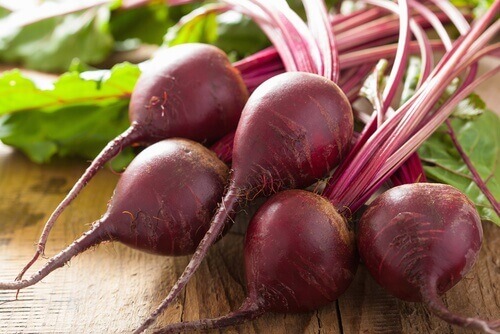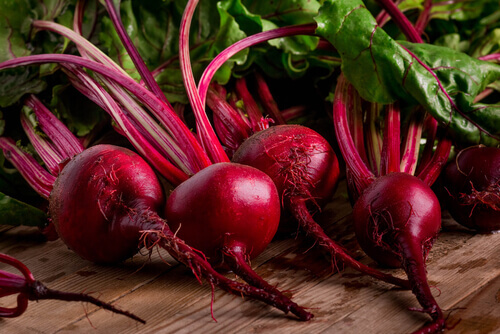What Makes Beetroot a Fitness Superfood?

Beetroot is a fairly common food in most households. Although we see it in the supermarkets, not many people dare to buy it or cook it. However, you should know that beetroot is quite an interesting food from a nutritional standpoint, especially for athletes.
In this article, we’ll explain all of its properties and the reasons why you should eat it regularly if you exercise. Additionally, we’ll talk about the different ways of eating it so that you can easily include it in your daily diet. You won’t get tired of eating it, we promise!
The characteristics of beetroot
Beetroot is a food with many healthy characteristics, here are just a few:
- It helps to clean the body: contributes to cleansing the circulatory system and the liver. Therefore, it helps them to stay healthy and also aids to their correct functioning.
- Low in calories: every 100 grams of this root only contains 43 calories. Therefore it’s a perfect ingredient for a light and healthy meal for those who want to lose weight.
- Prevents liquids retention: thanks to its potassium content, beetroot, prevents liquid retention in the body.
- It’s rich in fiber: fiber helps the digestive system, thus preventing constipation.
Due to all of these properties, many experts argue that beetroot is a “superfood”, and recommend its consumption regularly.
Why is it so interesting for athletes?
Beetroot is ideal for all people, not just athletes. Therefore, experts recommend that the general population consume this food regularly. However, it’s especially important for those people who practice high-performance sports and have a healthy diet.

This food is great for athletes because it’s rich in nitrate. And so, this works to dilate the circulatory system. Therefore, it allows circulation to be more efficient and simple.
Athletes can see results when eating beetroot regularly in terms of their increased resistance and reduced levels of fatigue. On the other hand, consuming beetroot regularly can also help lead a healthy lifestyle through diet. Thereby increasing energy, resistance, and stamina.
Different ways of eating beetroot
There are many ways of cooking beetroot, and also many ways of combining it on your plate. And so, it works perfectly with other cold or hot foods, and on formal or informal occasions.
Beet chips
These delicious chips made of beets are a healthy way to snack that satisfies us until the next meal. To make them, you simply need to clean and slice the beets thinly.
Then, add a pinch of salt and put in the oven until they’re crispy. And so, with these chips, you’ll put an end to those unhealthy snacks.
Beet salad
Since this vegetable combines so well with any meal, salads aren’t going to be the exception. You can add it in many ways, but we recommend eating them broiled. In order to make these, wash them and wrap them in aluminum foil, without peeling.

Then, put them in the oven and pierce with a toothpick to check when they’re ready. When you feel little to no resistance when piercing, they’ll be ready. Finally, just peel them and serve them with any sauce you like.
These are just a few examples of how to include beetroot in your meals regularly, but there are many more. The chips are perfect to decorate special plates. On the other hand, the broiled beets are perfect as a side for any other plate.
And so, beetroot is very interesting food for all people, and especially for athletes thanks to its high nitrate content. It helps to increase energy and resistance, allowing you to reach higher sporting results. Additionally, it’s quite easy to cook and is versatile in the kitchen.
Beetroot is a fairly common food in most households. Although we see it in the supermarkets, not many people dare to buy it or cook it. However, you should know that beetroot is quite an interesting food from a nutritional standpoint, especially for athletes.
In this article, we’ll explain all of its properties and the reasons why you should eat it regularly if you exercise. Additionally, we’ll talk about the different ways of eating it so that you can easily include it in your daily diet. You won’t get tired of eating it, we promise!
The characteristics of beetroot
Beetroot is a food with many healthy characteristics, here are just a few:
- It helps to clean the body: contributes to cleansing the circulatory system and the liver. Therefore, it helps them to stay healthy and also aids to their correct functioning.
- Low in calories: every 100 grams of this root only contains 43 calories. Therefore it’s a perfect ingredient for a light and healthy meal for those who want to lose weight.
- Prevents liquids retention: thanks to its potassium content, beetroot, prevents liquid retention in the body.
- It’s rich in fiber: fiber helps the digestive system, thus preventing constipation.
Due to all of these properties, many experts argue that beetroot is a “superfood”, and recommend its consumption regularly.
Why is it so interesting for athletes?
Beetroot is ideal for all people, not just athletes. Therefore, experts recommend that the general population consume this food regularly. However, it’s especially important for those people who practice high-performance sports and have a healthy diet.

This food is great for athletes because it’s rich in nitrate. And so, this works to dilate the circulatory system. Therefore, it allows circulation to be more efficient and simple.
Athletes can see results when eating beetroot regularly in terms of their increased resistance and reduced levels of fatigue. On the other hand, consuming beetroot regularly can also help lead a healthy lifestyle through diet. Thereby increasing energy, resistance, and stamina.
Different ways of eating beetroot
There are many ways of cooking beetroot, and also many ways of combining it on your plate. And so, it works perfectly with other cold or hot foods, and on formal or informal occasions.
Beet chips
These delicious chips made of beets are a healthy way to snack that satisfies us until the next meal. To make them, you simply need to clean and slice the beets thinly.
Then, add a pinch of salt and put in the oven until they’re crispy. And so, with these chips, you’ll put an end to those unhealthy snacks.
Beet salad
Since this vegetable combines so well with any meal, salads aren’t going to be the exception. You can add it in many ways, but we recommend eating them broiled. In order to make these, wash them and wrap them in aluminum foil, without peeling.

Then, put them in the oven and pierce with a toothpick to check when they’re ready. When you feel little to no resistance when piercing, they’ll be ready. Finally, just peel them and serve them with any sauce you like.
These are just a few examples of how to include beetroot in your meals regularly, but there are many more. The chips are perfect to decorate special plates. On the other hand, the broiled beets are perfect as a side for any other plate.
And so, beetroot is very interesting food for all people, and especially for athletes thanks to its high nitrate content. It helps to increase energy and resistance, allowing you to reach higher sporting results. Additionally, it’s quite easy to cook and is versatile in the kitchen.
All cited sources were thoroughly reviewed by our team to ensure their quality, reliability, currency, and validity. The bibliography of this article was considered reliable and of academic or scientific accuracy.
- FEN. (2014). Remolacha. Verduras y Hortalizas. Recuperado de: http://www.fen.org.es/mercadoFen/pdfs/remolacha.pdf
- Pardo, L. A., & Zarazaga, B. C. (2013). Mo de remolacha: Suplemento natural para deportistas. Medicina Naturista, 7(2), 116–118.
This text is provided for informational purposes only and does not replace consultation with a professional. If in doubt, consult your specialist.








